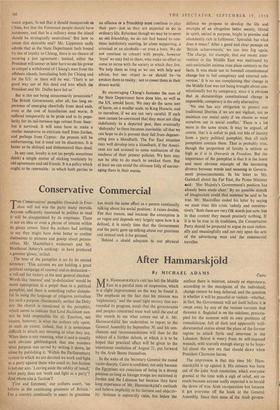Conservative Commercial
T.
Any it w is no its g to S then alit[ Hea age an Conservatives' pamphlet Onwards in Free- Join will not win the party many recruits. 3ne sufficiently interested in politics to read ill be disappointed by its emptiness. There t an idea or even a phrase of interest within lossy covers. Since the authors had nothing ty they might have done better to confine [selves to pictures and gossip about person- s, Mr. Macmillan's waistcoats and Mr. hcoat AmoryIs cooking : to have produced mine 'glossy,' in fact. r Th sente polit a rol Won
More
pam ful i for s nor whit not reasc to S diffic Whe such what alon syste as a is no what And 'Fi belie For he tone of the pamphlet is set by its second 'ace : 'This autumn we are holding a great ical campaign of renewal and re-dedication- I call for victory at the next general election.' is like 'renewal' and 're-dedication' would be appropriate in a pulpit than in a political phlet, and there is something rather distaste- using the language of religious revivalism Lich a purpose. (Incidentally, neither the Deity the church is mentioned in the pamphlet, h seems to indicate that Lord Hailsham can- be held responsible for it). Emotion, not In, however, is what the authors rely upon; ich an extent, indeed, that it is sometimes ult to attach any meaning to what they say. n there is any meaning, what is said is usually obvious gobbledegook that one wonders purpose was served by writing it down, let by publishing it. 'Within the Parliamentary m to which we are devoted we work and fight party against those who assail us; but faction t our aim.' Leaving aside the oddity of 'assail,' party does not 'work and fight as a party'? whose aim is 'faction'?
rst and foremost,' our authors assert, 'we ye in the continuing greatness of Britain.' I country continually to assert its greatness has much the same effect as a person continually talking about his social position : it raises doubts. For that reason, and because the conception is so vague and depends very largely upon how it is defined, it is surely time that the Government and the party gave up talking about our greatness and instead took it for granted.
'Behind a shield adequate to our physical defence we propose to develop the life and example of an altogether better society, liberal in spirit, united in purpose, bright in promise and abundantly rich in fulfilment.' Splendid; but what does it mean? After a good and clear passage on 'British achievements,' we run into fog again. 'The charge, for example, that our recent inter- vention in the Middle East was motivated by anti-nationalist animus runs plain contrary to the facts. It was Made not to forestall constitutional change but to foil conspiracy and external sub- version.' It is no use complaining that change in the Middle East was not being brought about con- stitutionally but by conspiracy, since it is obvious that in dictatorships constitutional change is impossible; conspiracy is the only alternative.
'No one has any obligation to protect our traditional liberties if we are not vigilant, nor to maintain our social unity if we choose to wear ourselves out in social conflict.' There is a lot more in the same strain. It may be argued, of course, that it is unfair to pick out bits of inanity from a party political pamphlet, that all such pamphlets contain them. That is probably true, though the proportion of fatuity is seldom as high as it is in Onwards in. Freedom. But the importance of the pamphlet is that it is the latest and most obvious example of the increasing divorce between words and meaning in Govern- ment pronouncements. In his letter to Mr. Gaitskell about the Far East, the Prime Minister said : 'Her Majesty's Government's position has already been made clear.' By no possible stretch of imagination could that sentence be said to be true. Mr. Macmillan ended his letter by saying we must treat this crisis 'calmly and construc- tively.' Both these are very OK words just now, but in that context they meant precisely nothing. If it is to be true to its traditions, the Conservative Party should be prepared to argue its case ration- ally and meaningfully and not rely upon the arts of the advertising man and the commercial traveller.


































 Previous page
Previous page